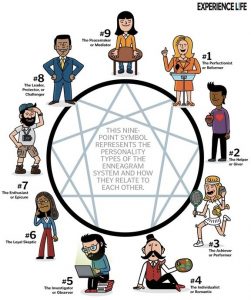
Shownotes
Wisdom-Trek / Creating a Legacy
Welcome to Day 993 of our Wisdom-Trek, and thank you for joining me.
This is Guthrie Chamberlain, Your Guide to Wisdom
The Enneagram System – Type Number Nine
Thank you for joining us for our five days per week wisdom and legacy building podcast. We are broadcasting from our studio at The Big House in Marietta, Ohio. This is Day 993 of our trek, and it is time for our Philosophy Friday series. Each Friday we will ponder some of the basic truths and mysteries of life and how they can impact us in creating our living legacy.
As we continue on this trek called life, sometimes we have questions about life, so our Friday trek is a time when we can “Ask Gramps.” Gramps will answer questions that you would like to ask your dad or granddad, but for whatever reason are unable to. No matter how old we are, I know that all of us would like the opportunity to ask Dad or Gramps questions about life in many areas.
Today is the sixteenth episode in our series delving into what makes each of us respond differently to life situations and circumstances. Understanding ourselves and how others may interpret life through their paradigm will allow us to interact with each other with more love and compassion. This empathy can be achieved by utilizing a profound tool called “The Enneagram.” If you have missed any of our past thirteen Friday series, I would recommend going back and listening to them or reading the Wisdom Journals.
As a review, the tool that we refer to as the Enneagram (Any-a-Gram) is a circle with nine interconnected points (Ennea refers to 9, and Gram refers to a drawing). Check out today’s or a prior week’s Wisdom Journal for a representation of it. I have also included a copy of “The Enneagram At-A-Glance,” which was compiled by Suzanne H. Eller in today’s Wisdom Journal. If you would like a PDF copy, click on the link in today’s Wisdom Journal located on our website Wisdom-Trek.com.
I would also recommend the book The Road Back to You written by Ian Morgan Cron and Suzanne Stabile. It is an excellent book about an enneagram journey to self-discovery from a Christian perspective.
In the first seven episodes, we explored how The Enneagram System works and then presented an overview of all nine personality types. So far we have taken a deep dive into “The Reformer,” “The Helper,” “The Achiever,” “The Individualist,” “The Investigator,” “The Loyalist,” “The Enthusiast,” and “The Challenger.” This week we will explore the final type Number Nine “The Peacemaker.” Next week we begin a series of episodes on Type Combinations and what the potential relationship benefits and issues are with each combination.
Since we are exploring the Enneagram in detail, I would also recommend reading the Wisdom Journal for each Friday to see the diagrams presented each week. As helpful as the Enneagram is, keep in mind, it is still only a tool, and cannot replace or usurp the precepts that are found in God’s Word. All decisions and actions that we make in life must be in harmony with God’s precepts.
So the questions for the next several months will be…
“Hey, Gramps, why do people act and react to situations and circumstances in life differently? How can I gain wisdom to better understand myself and others so that I can love, serve, and minister to them on a deeper level?”
The Enneagram System – Type Number Nine – The Peacemaker
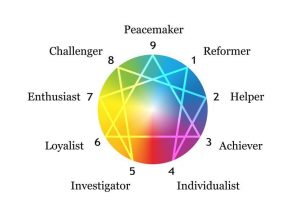
9 – THE PEACEMAKER
Enneagram Type Nine
The Easygoing, Self-Effacing Type: Receptive, Reassuring Agreeable, and Complacent
· Type Nine in Brief
Nines are accepting, trusting, and stable. They are usually creative, optimistic, and supportive, but can also be too willing to go along with others to keep the peace. They want everything to go smoothly and be without conflict, but they can also tend to be complacent, simplifying problems and minimizing anything upsetting. They typically have problems with inertia and stubbornness.
At their Best: indomitable and all-embracing, they are able to bring people together and heal conflicts.
Basic Fear: Of loss and separation
Basic Desire: To have inner stability “peace of mind”
Enneagram Nine with an Eight-Wing: “The Referee”
Enneagram Nine with a One-Wing: “The Dreamer”
Key Motivations: Want to create harmony in their environment, to avoid conflicts and tension, to preserve things as they are, to resist whatever would upset or disturb them.
The Meaning of the Arrows (in brief)
When moving in their Direction of Disintegration (stress), complacent Nines suddenly become anxious and worried like unhealthy Sixes. However, when moving in their Direction of Integration (growth), slothful, self-neglecting Nines become more self-developing and energetic, like healthy Threes.
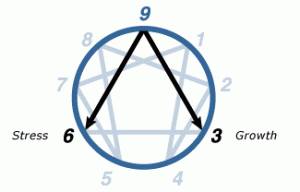
· Type Nine Overview
We have called personality type Nine “The Peacemaker” because no type is more devoted to the quest for internal and external peace for themselves and others. They are typically “spiritual seekers” who have a great yearning for connection with the cosmos, as well as with other people. They work to maintain their peace of mind just as they work to establish peace and harmony in their world. The issues encountered in the Nine are fundamental to all psychological and spiritual work—being awake versus falling asleep to our true nature; presence versus entrancement, openness versus blockage, tension versus relaxation, peace versus pain, union versus separation…
Ironically, for a type so oriented to the spiritual world, Nine is the center of the Instinctive Center and is the type that is potentially most grounded in the physical world and in their own bodies. The contradiction is resolved when we realize that Nines are either in touch with their instinctive qualities and have tremendous elemental power and personal magnetism, or they are cut off from their instinctual strengths and can be disengaged and remote, even lightweight.
To compensate for being out of touch with their instinctual energies, Nines also retreat into their minds and their emotional fantasies. (This is why Nines can sometimes misidentify themselves as Fives and Sevens, “head types,” or as Twos and Fours, “feeling types.”) Furthermore, when their instinctive energies are out of balance, Nines use these very energies against themselves, damming up their own power so that everything in their psyches becomes static and inert. When their energy is not used, it stagnates like a spring-fed lake that becomes so full that its own weight dams up the springs that feed it. When Nines are in balance with their Instinctive Center and its energy, however, they are like a great river, carrying everything along with it effortlessly.
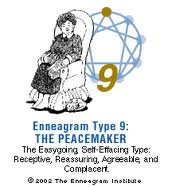
We have sometimes called the Nine the crown of the Enneagram because it is at the top of the symbol and because it seems to include the whole of it. Nines can have the strength of Eights, the sense of fun and adventure of Sevens, the dutifulness of Sixes, the intellectualism of Fives, the creativity of Fours, the attractiveness of Threes, the generosity of Twos, and the idealism of Ones. However, what they generally do not have is a sense of really inhabiting themselves—a strong sense of their own identity.
Ironically, therefore, the only type the Nine is not like is the Nine itself. Being a separate self, an individual who must assert herself against others, is terrifying to Nines. They would rather melt into someone else or quietly follow their idyllic daydreams.
Reed, a nationally known business consultant, comments on this tendency.
“I am aware of focusing on other people, wondering what they are like, how and where they live, etc. In a relationship with others, I often give up my own agenda in favor of the other person’s. I have to be on guard about giving in to other’s demands and discounting my own legitimate needs.”
Nines demonstrate the universal temptation to ignore the disturbing aspects of life and to seek some degree of peace and comfort by “numbing out.” They respond to pain and suffering by attempting to live in a state of premature peacefulness, whether it is in a state of false spiritual attainment or in more gross denial. More than any other type, Nines demonstrate the tendency to run away from the paradoxes and tensions of life by attempting to transcend them or by seeking to find simple and painless solutions to their problems.
To emphasize the pleasant in life is not a bad thing, of course—it is simply a limited and limiting approach to life. If Nines see the silver lining in every cloud as a way of protecting themselves from the cold and rain, other types have their distorting viewpoints, too. For example, Fours focus on their own wounded-ness and victimization, Ones on what is wrong with how things are, and so forth. By contrast, Nines tend to focus on the “bright side of life” so that their peace of mind will not be shaken. But rather than deny the dark side of life, what Nines must understand is that all of the perspectives presented by the other types are true, too. Nines must resist the urge to escape into “premature Buddhahood” or the “white light” of the Divine and away from the mundane world. They must remember that “the only way out is through.”
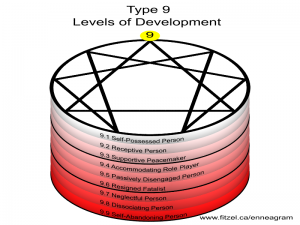
· Type Nine —Levels of Development
Healthy Levels
Level 1 (At Their Best): Become self-possessed, feeling autonomous and fulfilled: have great equanimity and contentment because they are present to themselves. Paradoxically, at one with self, and thus able to form more profound relationships. Intensely alive, fully connected to self and others.
Level 2: Deeply receptive, accepting, unselfconscious, emotionally stable, and serene. Trusting of self and others, at ease with self and life, innocent and simple. Patient, unpretentious, good-natured, genuinely nice people.
Level 3: Optimistic, reassuring, and supportive: have a healing and calming influence—harmonizing groups, bringing people together: a good mediator, synthesizer, and communicator.
Average Levels
Level 4: Fear conflicts, so become self-effacing and accommodating, idealizing others and “going along” with their wishes, saying “yes” to things they do not really want to do. Fall into conventional roles and expectations. Use philosophies and stock sayings to deflect others.
Level 5: Active, but disengaged, unreflective, and inattentive. Do not want to be affected, so become unresponsive and complacent, walking away from problems, and “sweeping them under the rug.” Thinking becomes hazy and ruminative, mostly comforting fantasies, as they begin to “tune out” reality, becoming oblivious. Emotionally indolent, unwillingness to exert self or to focus on problems: indifference.
Level 6: Begin to minimize problems, to appease others and to have “peace at any price.” Stubborn, fatalistic, and resigned, as if nothing could be done to change anything. Into wishful thinking, and magical solutions. Others are frustrated and angry by their procrastination and unresponsiveness.
Unhealthy Levels
Level 7: Can be highly repressed, undeveloped, and ineffectual. Feel incapable of facing problems: become obstinate, dissociating self from all conflicts. Neglectful and dangerous to others.
Level 8: Wanting to block out of awareness anything that could affect them, they dissociate so much that they eventually cannot function: numb, depersonalized.
Level 9: They finally become severely disoriented and catatonic, abandoning themselves, turning into shattered shells. Multiple personalities are possible. Generally corresponds to the Schizoid and Dependent personality disorders.
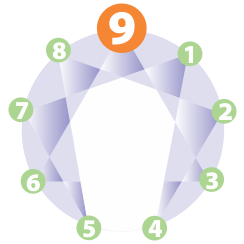
Personal Growth Recommendations for Enneagram Type Nine
- It is worth examining your type’s tendency to go along with others, doing what they want to keep the peace and be nice. Will constantly acquiescing to the wishes of others provide the kind of relationships that will really satisfy you? Remember, it is impossible to love others if you are not truly present to them. This means that you have to be yourself, which you (paradoxically) have to be independent so that you can really be there for others when they need you.
- Exert yourself. Force yourself to pay attention to what is going on. Do not drift off or tune people out or daydream. Work on focusing your attention to become an active participant in the world around you. Try to become more mentally and emotionally engaged.
- Recognize that you also have aggressions, anxieties, and other feelings that you must deal with. Negative feelings and impulses are a part of you, and they affect you emotionally and physically whether or not you acknowledge them. Furthermore, your negative emotions are often expressed inadvertently and get in the way of the peace and harmony you want in your relationships. It is best to get things out in the open first, at least by allowing yourself to become aware of your feelings.
- Although this will be very painful for you, if your marriage has ended in divorce or if you are having problems with your children, you must honestly examine how you have contributed to these problems. Examining troubled relationships will be extremely difficult because the people involved have been close to your heart. The feelings you have for others endow you with much of your identity and self-esteem. But if you really love others, you can do no less than examine the role you have played in whatever conflicts that have arisen. In the last analysis, the choice is simple: you must sacrifice your peace of mind (in the short run) for the satisfaction of genuine relationships (in the long run).
- Exercise frequently to become more aware of your body and emotions. (Some Nines run around doing errands and think that they are getting enough exercise.) Regular exercise is a healthy form of self-discipline and will increase your awareness of your feelings and other sensations. Developing body-awareness will help teach you to concentrate and focus your attention in other areas of your life as well. Exercise is also a good way to get in touch with and express some aggressions.
That will conclude our focus on personality type number Nine – The Peacemaker. You are important in God’s Kingdom; live to your fill God-Given potential. A word of encouragement from God’s Word for those of you who are Enneagram type number Nine is found in Ephesians 2:10,“For we are God’s masterpiece. He has created us anew in Christ Jesus, so we can do the good things he planned for us long ago.”
Join us again next Friday as we further explore the Enneagram on our Ask Gramps episode. We will begin exploring type combinations and how best to maintain meaningful and productive relationships with each other. The information that we explore will allow you to unlock who you are as we travel on our trek of life and discover more about yourself and others as you impact God’s kingdom. I know you will find these insights interesting, practical, and profitable in living a rich and satisfying life.
Our next trek is Mediation Monday where we will help you reflect on what is most important in life. So encourage your friends and family to join us and then come along on Monday for another day of our Wisdom-Trek, Creating a Legacy.
